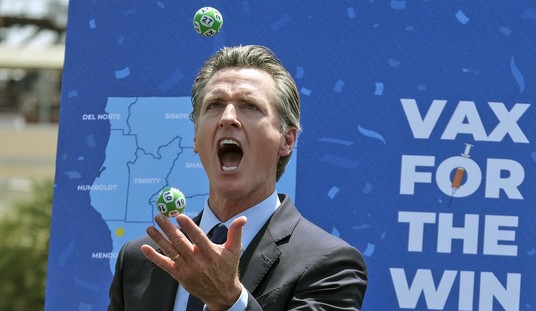“The Washington Post Has a Fever, and the Only Cure is More Ted Cruz Birtherism,” Ace writes at the Breitbart.com group blog. “It’s breathtaking,” he notes, and really, you do have to see the post to believe it, since it features screen shots of over a dozen Ted Cruz birther-related stories, which if I’m looking at the date stamps correctly, all ran over the course of only one or two days at the Post.
 Jim Geraghty of NRO estimated that in 2006, the Washington Post ran “approximately 100 articles, op-eds, [and] editorials” spotlighting Republican George Allen’s moronic “macaca” gaffe involving his botched effort at calling out a mohawk-wearing video tagger hired by his opponent, Democrat Jim Webb, to stalk the Allen campaign. The paper’s efforts helped Webb, the Post’s preferred candidate, narrowly win the election, which helped to tip the Senate into Democrat hands. It also derailed a potential Allen bid for the White House in 2008 — all of which were desired goals by the admittedly left-leaning newspaper.
Jim Geraghty of NRO estimated that in 2006, the Washington Post ran “approximately 100 articles, op-eds, [and] editorials” spotlighting Republican George Allen’s moronic “macaca” gaffe involving his botched effort at calling out a mohawk-wearing video tagger hired by his opponent, Democrat Jim Webb, to stalk the Allen campaign. The paper’s efforts helped Webb, the Post’s preferred candidate, narrowly win the election, which helped to tip the Senate into Democrat hands. It also derailed a potential Allen bid for the White House in 2008 — all of which were desired goals by the admittedly left-leaning newspaper.
Three years later, the Post tried the same tactics against Republican Bob McDonnell, running to become governor of Virginia, this time focusing on McDonnell’s college thesis. As Jennifer Rubin wrote in November of 2009 at the Weekly Standard, before she herself eventually became a Post employee, McDonnell’s winning campaign successfully rebutted the “dozens of stories” the paper ran in the fall of 2009, as part of its Alinsky/Raines-style “flood the zone” tactics:
The McDonnell camp quickly made some critical tactical decisions. First, the Monday after the story broke McDonnell held a 90-minute media call to explain his views, and answer all questions. Second, rather than respond to every potential allegation they focused on the most potent one–that McDonnell was hostile to working women. His TV ads focused heavily on this issue, featuring testimonials by his daughters and women who had worked for him.
Larry J. Sabato explains that “the thesis story actually helped Deeds at first. For nearly a month the contents of McDonnell’s thesis closed the gap to a near-tie.” But then Deeds went, as one party insider says, “bonkers” over the issue, badly overplaying his hand. McDonnell communications director Tucker Martin says, “It was like someone threw a tennis ball over the fence and we all watched the Labrador Retriever race after it, leaving the whole yard to us.” Deeds rolled out TV ads and a Twitter feed devoted to the thesis and even organized book clubs to conduct “readings” of the thesis.
One McDonnell adviser says that it took a “lot of discipline” both to narrow the focus and to continue to stick to his positive, issue-oriented message.
“One day no fewer than 11 Post editors and reporters peppered the campaign with thesis queries,” Jennifer wrote. We’ll look at the Post’s next two rounds of macaca-inspired malarkey after the page break.
In 2011, the paper used the same macaca tactics against both Rick Perry and Marco Rubio, each with diminishing results. The latter attack involved the Post descending into Birther-land as well, as Moe Lane wrote at Red State in October of 2011:
And now we have this silly little hit piece on Marco Rubio’s story regarding his parents, which is not just so inaccurate that it’s being smacked down by other newspapers; it’s so inaccurate that it’s being smacked down by the newspaper’s own columnists. The problem? The guy who wrote the article – which implied that Rubio habitually lied about when his parents fled Cuba without actually giving proof that Rubio habitually lied about when his parents fled Cuba – is himself an apologist for the Castro regime (h/T: Erick Erickson) who was apparently willing to use Birther agitprop* (I have another word for it, but it’s unprintable). Actually, the real problem for the Washington Post is that Marco Rubio is a young, engaging, excellent rhetorician and politician who has inexplicably picked the wrong party to belong to; couple that with a certain bitter frustration that their side’s young, engaging, etc. etc. who they helped elect President in 2008 has turned out to be neither an excellent rhetorician or politician and you can understand their actions. Well, that and the chimerical nostalgia of how the paper was able to change the news in 2006.
Seriously, guys? The first step to fighting an addiction is to admit that you have one.
Why start now? The Post’s addiction to the Macaca meme has done wonders for its bottom line. (Shrinking it down to where the once-illustrious paper was bought this month for walking around money by Jeff Bezos, that is.)










Join the conversation as a VIP Member